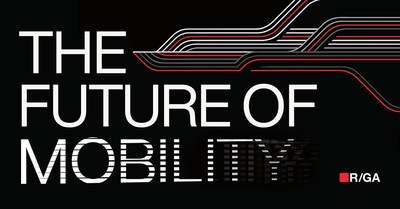Two-Thirds of People Don't Believe They Will Have The Transportation Flexibility to Meet Future Needs
The R/GA Future of Mobility Report reveals that 67% of global vehicle owners fear a lack of flexible transportation options in the future. The report indicates a trend towards Mobility-as-a-Service (MaaS), with 66% of personal vehicle owners willing to relinquish their cars over the next decade. Car sharing is projected to reach 36 million users by 2025, while global mobility service revenues are expected to soar to $1298B by 2024 from $616.1B in 2020. The report emphasizes the need for improved mobility options and highlights consumer concerns regarding availability and safety.
- 66% of personal vehicle owners are open to adopting Mobility-as-a-Service (MaaS) solutions in the next 10 years.
- Global mobility service revenue expected to grow to $1298B by 2024 from $616.1B in 2020.
- Car sharing projected to reach 36 million users by 2025.
- 35% of consumers express concerns about the lack of availability of MaaS in their areas.
- 35% of consumers cite safety concerns as a barrier to adopting MaaS solutions.
NEW YORK, June 15, 2021 /PRNewswire/ -- The R/GA Future of Mobility Report shows that two-thirds of vehicle owners globally (
According to the report, two-thirds (
The key findings of the report are:
- While
91% of personal vehicle owners said their vehicles give them a sense of freedom,75% wish they could drive their personal vehicle less. 66% of personal vehicle owners and82% of leases are willing to give up their vehicles in favor of MaaS over the next 10 years.- Car sharing is estimated to reach 36 million users by 2025, and the usership from ride-hailing and taxi services alone has grown to 1.4 billion customers.
- Global mobility service revenue is expected to grow to
$129 8B by 2024 from$616.1B in 2020.
Ashish Prashar, Global Chief Marketing Officer of R/GA, stated, "We take "mobility" for granted, it's synonymous with transportation, but moving stuff and people is a basic description. Mobility is more than that. It's about access. Getting to places necessary for living a healthy life – your job, school, community centers, and parks. Living by a bus that comes once an hour isn't mobility. And owning a car in a city with congested highways isn't mobility, either."
Prashar added, "Mobility isn't just having access to one mode of transportation. Mobility is having transportation options and the quality of those options. The future of mobility will require investment in infrastructure. More Mobility-as-a-Service (MaaS) as a reflection of the diversity of consumer lifestyles. It's now more important than ever for transportation companies to make space for connected people-first experiences that allow for a differentiated brand offering."
Consumers' emerging needs and mobility behavior
The shift toward accessing mobility services is projected to accelerate as consumers' lifestyles adapt, creating a need for more flexible mobility options. The emergence of Mobility-as-a-Service (MaaS) has been accelerated by congestion in cities, high traffic, ease of parking, and the personalization of mobility services. The emergence of Mobility-as-a-Service (MaaS) has become an efficient and reliable means of transport due to flexible mobility options to suit consumer's needs and living conditions.
MaaS provides freedom, but there are two primary barriers to adoption
Mobility-as-a-Service (MaaS) provides consumers with the inefficient costs of personal vehicle ownership, door-to-door transport, and dynamic, personalized options to suit consumers' evolving travel needs. Consumers who use MaaS services more frequently become more likely to see MaaS options as a viable replacement for their vehicles. The desire to switch to its services is not unique to urban consumers.
Brand as an Operating System: mobility players who own the consumer relationship will play an outsized role as the MaaS ecosystem mature
Brands must facilitate seamless integration and access to other brand services within their own consumer experience to drive recurring value.
Download the full report at http://rga.com/futurevision/future-of-mobility.
About R/GA
R/GA is an atypical innovation design and communications company. We help brands and businesses define, connect with, and create more human futures. Our work spans innovation consulting, org design, brand design, experience design, and marketing communications.
R/GA is part of The Interpublic Group of Companies (NYSE: IPG), one of the world's largest innovation and marketing services organizations, and has more than 1600 employees globally, with 16 offices across the United States, Europe, South America, and Asia-Pacific. For more information about R/GA, please visit www.rga.com, or follow @rga on Twitter.
Research Methodology
In fielding our survey, R/GA set out to better understand the shifting landscape of mobility services and car ownership. To do so, we surveyed vehicle owners to understand their views towards emerging MaaS players and personal vehicle ownership. We included users of four different types of mobility services in our survey: ride-hailing, car-sharing, scooter-sharing, and bike-sharing.
The survey was in the field from August 30 - September 30, 2020. The survey was translated into the predominant language spoken in each country. 5,084 customers were surveyed across 10 countries: China, Germany, Australia, Brazil, India, UK, Mexico, Argentina, Colombia, and the USA. Categories fielded consisted of route finding, technology, ride-hailing, micro-mobility (bike-sharing), car sharing, and auto OEM.
![]() View original content to download multimedia:http://www.prnewswire.com/news-releases/two-thirds-of-people-dont-believe-they-will-have-the-transportation-flexibility-to-meet-future-needs-301312039.html
View original content to download multimedia:http://www.prnewswire.com/news-releases/two-thirds-of-people-dont-believe-they-will-have-the-transportation-flexibility-to-meet-future-needs-301312039.html
SOURCE RGA
FAQ
What does the R/GA Future of Mobility Report reveal about vehicle ownership?
How many people are willing to give up their vehicles for Mobility-as-a-Service?
What is the projected growth of global mobility service revenue?
What barriers do consumers face in adopting Mobility-as-a-Service?








